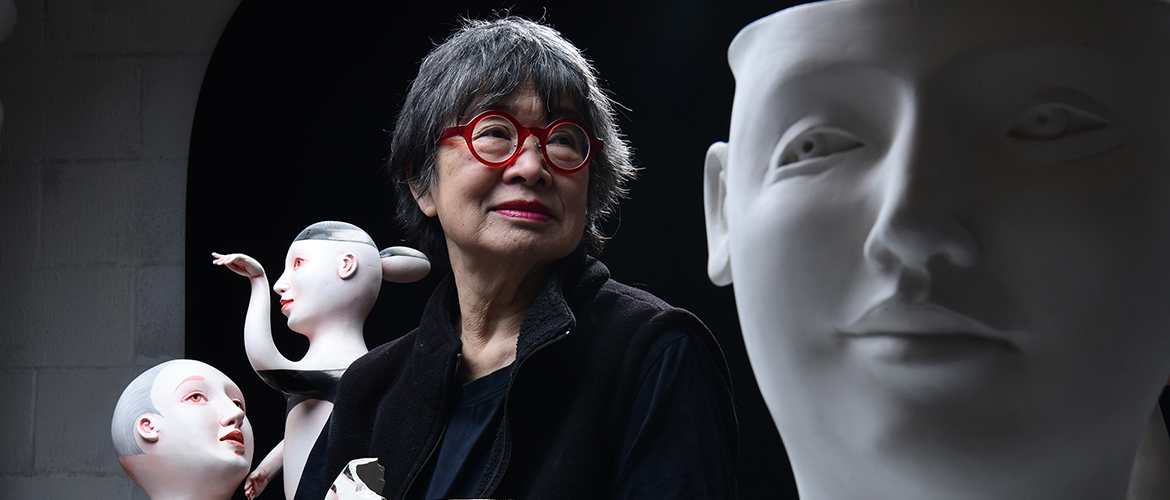
Warashina Honored by the Smithsonian
Earlier this year, the Smithsonian honored artist, alumna, and UW art professor emerita Patti Warashina (BFA, MFA, Art, ’62, ’64) as its 2020 Smithsonian Visionary Artist. The Smithsonian Visionary Award is presented annually to artists who have reached the pinnacle of sculptural arts and design, who have works in major museums, and who have demonstrated distinction, creativity, artistry, and vision in their respective medium.
Warashina, whose humor and innovative perspectives on the human condition put a new face on ceramics, enrolled at the UW intent on becoming a dental hygienist. But a required elective in beginning drawing captivated her and compelled her to take more art classes, which ultimately introduced her to the material of clay. She switched majors and went on to become one of America’s foremost ceramic artists.
Now 80, Warashina continues to create satirical and humorous figurative sculptures that explore the absurdity and foibles of human nature, as well as feminism and other political and social topics. In announcing the Smithsonian award, Nora Atkinson (BFA, Photography, 2002; MA, Museology, 2006), the curator-in-charge for the Renwick Gallery of the Smithsonian American Art Museum, described Warashina as a defining figure in the West Coast Funk Art movement during the 1960s and 1970s, who uses humor and social commentary “to address serious personal, political, and social subjects, from feminist critiques of the art world, to the internment of the Japanese during World War II, to the absurdity of contemporary social media.”
Learn more about Warashina and view her work online in the University of Washington Magazine.
Toro Honored for Research and Promoting Diversity
Tatiana Toro, the Craig McKibben and Sarah Merner Professor in Mathematics, received the 2020 Blackwell-Tapia Prize from the Statistical and Applied Mathematical Sciences Institute (SAMSI), an institute that brings together the statistical sciences and the applied mathematical sciences with disciplinary science “to confront the very hardest and most important data- and model-driven scientific challenges.”
The award is named for mathematical and statistical experts David Blackwell, the first African American elected to the National Academy of Sciences, and Richard Tapia, winner of the 2010 National Medal of Science. It recognizes “excellence in research among people who have promoted diversity within the mathematical and statistical sciences.”

Toro is an analyst whose work lies at the interface of geometric measure theory, harmonic analysis, and partial differential equations. “Her work focuses on understanding mathematical questions that arise in an environment where known data are very rough,” the institute said in a news release. “The main premise of her work is that under the right lens, objects which at first glance might appear to be very irregular, do exhibit quantifiable regular characteristics.”
In addition to the Blackwell-Tapia Prize, Toro received the UW Distinguished Graduate Mentor Award in 2019 and was named to the American Academy of Arts & Sciences in May 2020.
2020 UW Awards of Excellence
Each year, the University of Washington present Awards of Excellence to recognize exceptional contributions to the UW and the community. Recipients for 2020 included the following faculty and staff from the College of Arts & Sciences.
Distinguished Teaching Award

Xiaosong Li
Harry & Catherine Jaynne Boand Endowed Professor of Chemistry
Li is an enthusiastic, dedicated instructor and mentor in the Chemistry Department, as well as associate chair for graduate education. He was also instrumental in creating a new professional degree program and new curriculum in the Chemistry Department. A dynamic speaker, he receives rave reviews from students in his classes of more than 500. “While the class was indeed challenging,” one student wrote, Li's teaching “made the course interesting.… It stretched my thinking and made me think of concepts in a new way.”
IAN SCHNEE
Senior Lecturer, Philosophy

Schnee encourages students to be well-prepared when they enter the classroom. He structures class time according to best practices, being mindful of pacing. Because he understands the psychology of learning, Schnee knows how to engage visual, tech-savvy Gen-Z students in philosophical questions. He’s active, inclusive and fun. One student noted, “Dr. Schnee’s course design resulted in some of the most engaging class discussions out of all of my philosophy coursework.”
TEACHING LEGACY AWARD
JACK P. KEATING
Psychology; Dean, UW branch campuses
(presented posthumously)

Even when teaching 700 students in Psychology 101, the late Jack Keating didn’t use notes. His “encyclopedic knowledge of psychology and engaging teaching style,” along with his commitment to intellectual rigor and social justice, inspired students and prepared them to turn their knowledge into action. Keating made the UW accessible and welcoming, co-chairing the committee that created the Department of American Ethnic Studies. He was instrumental in the development of UW Tacoma and UW Bothell, chairing the search for founding faculty and serving as dean of the branch campuses. The UW is recognizing Keating posthumously for his enduring legacy.
EXCELLENCE IN TEACHING AWARD

CHARLES C. LANFEAR
Graduate Staff Assistant, Sociology
Lanfear's enthusiasm for statistics and R, a software environment for statistical computing, is contagious. “He made all the students want to learn it,” one student wrote. In his interdisciplinary statistics courses, Lanfear skillfully explains concepts and presents well-organized, carefully sequenced slides. His Intro to R course “is an incredible resource … because it provides an appropriately paced opportunity to learn and apply R with the guidance of an expert instructor.”
DISTINGUISHED STAFF AWARD

POLLY OLSEN (YAKAMA)
Tribal Liaison, Burke Museum
In her outstanding work to amplify Native voices and heal the wounds of colonialism, Olsen has transformed the mission of the Burke Museum, fostering a culture that is welcoming, inclusive and authentic throughout the museum’s exhibits, events, and programs. Her work not only serves to connect Native people and communities with the Burke, but helps the public understand, acknowledge and be inspired by the people and tribes of the land our University stands on.
UNIVERSITY FACULTY LECTURE AWARD

JULIANNE DALCANTON
Professor and Chair, Astronomy
Dalcanton has been described as a “role model of determination and civility” in encouraging women and minorities to enter astronomy. A colleague praised her “outstanding teaching record, a result of her deep content knowledge, meticulous preparation, dedication to all students, natural empathy, and a happy demeanor that evokes enthusiasm from every audience and class.” An astronomy professor from another institution recalled Dalcanton's recent lecture at the American Astronomical Society conference: “Multiple people commented that it was clearly the best review talk they had ever heard. I agree.”
So Many Students, So Many Awards
Arts & Sciences students are making a difference in the classroom, on research projects, through internships, and more, so it comes as no surprise that they received a slew of awards this spring. Here are just some of their recent honors:
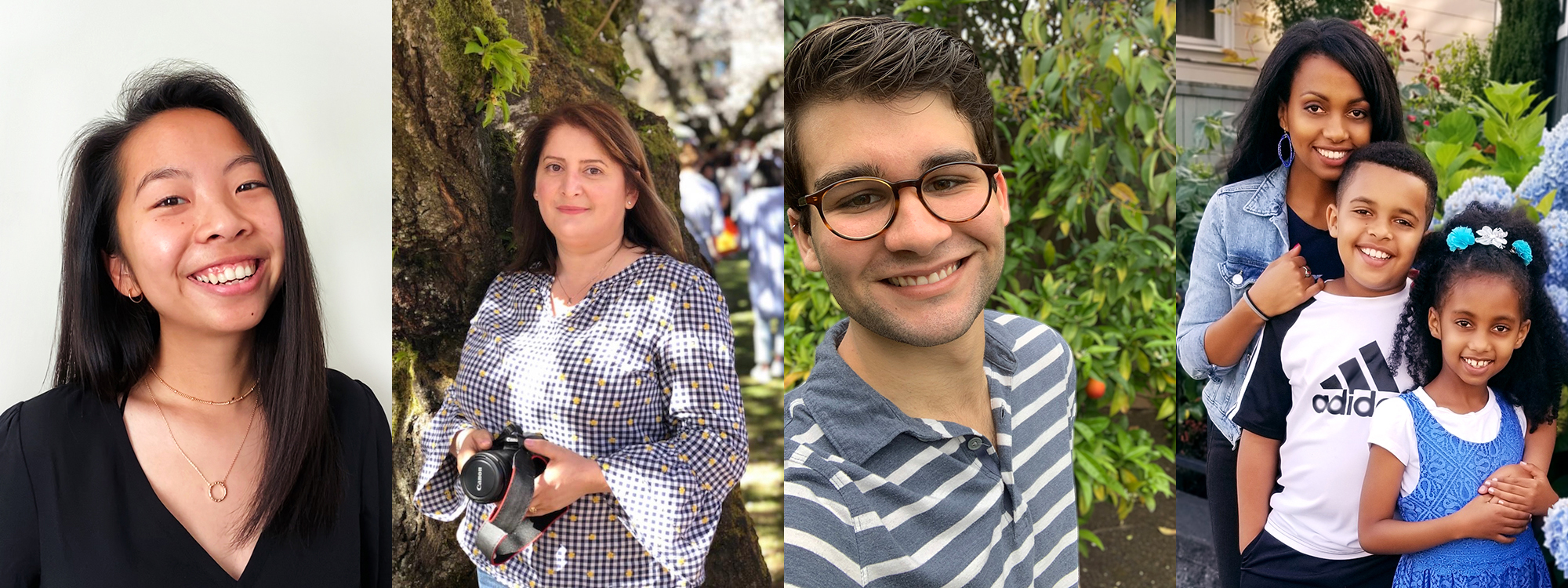
CAS Students in Husky 100
Each spring, the UW announces its Husky 100, recognizing 100 undergraduate and graduate students who are making the most of their time at the UW, actively connecting what happens inside and outside the classroom to make a difference on campus and in their communities. Of the students honored for 2020, 28 are from the College of Arts & Sciences, from undergraduates deeply involved in research to doctoral students promoting inclusive learning. To learn more, visit the UW’s Husky 100 webpage, which features photos and brief profiles of all 100 students. Congratulations to the honorees for this well-deserved recognition!
Two President’s Medalists, Both from CAS
Each year, the UW honors two graduating seniors — a four-year student and a transfer student — with the President’s Medal, which recognizes their distinguished academic records in their class. This year, both recipients were from the College of Arts & Sciences.

Fa'aumu Kaimana, with majors in Medical Anthropology & Global Health and Sociology, had a Husky experience and impressive academic success grounded in the importance of family. As a low-income student of color grappling with the recent loss of their mother, Fa’aumu created a chosen family through involvement with the Burke Museum, the Lushootseed language research project, and clubs and affinity groups connecting them with their Polynesian heritage. Fa’aumu further explored the concept of family in an honors thesis that investigated the role of family in Indigenous students’ educational success.
Savannah Cassis, a psychology major, came to the UW as a transfer student from Tacoma Community College with an interest in research. She passionately pursued her interests in the Cognition and Cortical Dynamics Lab through the Honors Psychology Program. In addition to her fascination with brain and behavioral science, she studied Japanese and plans to pursue a law degree focusing on Asian and comparative law, to help facilitate connections between Asia and the United States.
CAS Students Named Truman and Goldwater Scholars
Truman Scholarship
Truman Scholars are selected based on outstanding leadership, demonstrated civic engagement, academic potential and a desire to pursue a career in public service. Scholars receive up to $30,000 for graduate school to help prepare them for a career in public service.
Virginia Burton, a 47-year-old mother of three and a first-generation student majoring in political science, was recently selected for the prestigious Truman Scholarship, which recognizes future leaders driven to make change at the policy level.

After taking more than two decades off from formal education, Burton decided to return to school in 2017 after becoming frustrated with the criminal justice system. Having experienced addiction, incarceration and seeing her family’s experiences with the criminal justice system, she recognized education was the key to continuing her work more intentionally. She has served as a supervisor at a men’s shelter and volunteered with the Post Prison Education Program, a nonprofit that provides support to former prisoners while attending school post-release.
“I went back to school because the system made me angry," Burton says. "I believe I have a voice that speaks for people who are overlooked and disregarded. This scholarship allows me to develop my voice, speak for those who cannot speak for themselves and be a part of a community of world changers. It will provide me an opportunity to obtain a graduate degree without accruing tremendous debt. The Truman is also giving me an opportunity to model to my children how hard work pays off. More than anything, I want to show my kids a different life than the one I lived.”
Burton plans to earn a joint law degree and masters of public administration to advocate for prison and criminal justice reform.
Learn more about Virginia Burton.
Goldwater Scholarship

Goldwater Scholarships are granted to sophomores and juniors who show exceptional promise and plan to pursue research careers in math, engineering or the natural sciences.
Keyan Gootkin, an astronomy and physics double major, studies “the universe’s most massive stars near the end of their lives.” In addition to his work as an undergraduate researcher, he actively brings the stars down to Earth through service, serving as the student coordinator at the UW’s historical Theodor Jacobsen Observatory, co-chairing the Mobile Planetarium Committee, and serving as the outreach coordinator for the UW League of Astronomers. He says he plans to earn a Ph.D. in astrophysics “so that I can continue doing research as long as I can.”
Karen Zhang, a biochemistry and microbiology double major, is an undergraduate researcher in the UW's Molecular Information Systems Lab (MISL), which investigates technologies for storing digital data in DNA and is interested in all things at the intersection between computer science and biology. Through this interdisciplinary lab, Zhang has discovered a passion for synthetic biology and the essential role that computational algorithms play in interpreting biological data. She is also an editor for the UW Microbiology Journal. Zhang aims to obtain a PhD in synthetic biology/bioengineering or bioinformatics.
Arts & Sciences Medalists
Each year, the College honors exceptional graduating seniors with its Dean’s Medal, and exceptional graduate students with its Graduate Medal.
Dean's Medalists
Dean’s Medalists Madeline Bonner, Drew Callipare, Racquel West, and Julia Zhang are profiled in a Perspectives feature story.
Graduate Medalists

Christopher Diamond, from the Department of Asian Languages and Literature, focused his dissertation on the processes underlying canon-formation of Maithili literature—Maithili being one of the earliest vernacular literatures for North India. His research methodology was informed by history, linguistics, literature, religious performance, and textual studies. Department faculty note that Diamond has already acquired an international reputation, having presented his work nationally and internationally, and that his dissertation is only the first installment on which he can build with a lifetime worth of publications that will impact several fields.
Roneva Keel, Dean's Medalist in the Social Sciences, earned a PhD from the Department of History. Her dissertation explores the political economy of sugar production in the Philippines, Hawai‘i, and the U.S. West in the first half of the twentieth century, with special focus on Filipino migrant workers from the 1890s to the 1930s. She examines the emergence of sugar — both beet and cane — as an important node in the larger infrastructures of the trans-Pacific American empire, and looks at the shifting grounds on which Filipino workers made their claims for better working conditions and demanded recognition of their rights in light of their changing legal status. Faculty describe Keel as "one of the most promising students...in many years."
Other Awards, Honors, and Professorships
Honorary Awards
Publication Awards
Professorships
Other Honors
Honorary Awards
Katherine Beckett, S. Frank Miyamoto Professor of Sociology and chair of the Department of Law, Societies and Justice, and Heather Evans, lecturer in sociology, received the Consortium of Social Science Association (COSSA) 2020 Public Impact Award for research that led the Washington State Supreme Court to strike down the state’s death penalty statute, based on racial disparities and arbitrariness in the application of capital punishment. Previous honors have also been awarded for this work.
Dee Boersma, professor of biology and Wadsworth Endowed Chair in Conservation Science, was one of six finalists for the Indianapolis Prize. The Indianapolis Prize Finalists represent the world’s most successful professional wildlife conservationists, biologists, and scientists, and their heroic work has saved dozens of animal species and their habitats from extinction.
Charles Campbell, professor and B. Seymour Rabinovitch Endowed Chair in Chemistry, was honored for Exceptional Achievements in Catalysis by the American Chemical Society’s Catalysis Science & Technology Division.
Ana Mari Cauce, UW president and professor of psychology, and Tatiana Toro, the Craig McKibben and Sarah Merner Professor in Mathematics, were inducted into the American Academy of Arts and Sciences.
Dan Fu, assistant professor of chemistry, received a CAREER Award from the National Science Foundation, as well as a Maximizing Investigators’ Research Award from the National Institute of General Medical Sciences (NIGMS), one of the National Institutes of Health. The latter award is an R35 Outstanding Investigator Award that supports early stage investigators whose work falls within the NIGMS mission.
Faculty from the College recently recognized by the UW Latino Center for Health for outstanding achievements include María Elena García, professor of international studies, director of the Comparative History of Ideas Department and the Joff Hanauer Honors Professor in Western Civilization; Angelina Godoy, the Helen H. Jackson Chair in Human Rights and professor of law, societies & justice and international studies; Juan Guerra, professor and chair of American Ethnic Studies and professor of English; José Antonio Lucero, associate professor of international studies; Ileana Rodriguez-Silva, associate professor of history; and Joseph Sisneros, professor of psychology.
Jenna Grant, assistant professor of anthropology, artist Adrian Alarilla, and UW Southeast Asia librarian Judith Henchy won the Center for Research Libraries 2020 Primary Source Award for The Age of the Kampuchea Picture, a collaborative audiovisual installation. The award recognizes “the innovative application of methodologies to open or expand avenues of scholarly research in the social sciences or humanities.”
Five faculty from the UW Department of Astronomy have been named inaugural Fellows of the American Astronomical Society: professors Suzanne Hawley and Zeljko Ivezic, and emeritus professors Bruce Balick, Woody Sullivan, and George Wallerstein. The inaugural "Legacy Fellow" cohort includes 200 scientists from around the world who have been recognized for past awards, research achievements, teaching and service to AAS.
Sarah Keller, the Duane and Barbara LaViolette Endowed Professor of Chemistry, received the Lipidomics Excellence Award from from Lipotype GmbH, a German biotechnology company. The award promotes, supports, and strengthens researchers who are eager to contribute to the progress of life sciences through lipidomics.
Emily Levesque, assistant professor of astronomy, was awarded the 2020 Newton Lacy Pierce Prize, given annually by the American Astronomical Society for outstanding achievement over the past five years in observational astronomical research.
Andrew Meltzoff, professor of psychology and Job and Gertrud Tamaki Endowed Chair, received the G. Stanley Hall Award for 2020 from the American Psychological Association "for distinguished contributions to developmental psychology."
Sue Moore, UW affiliate professor of biology and of aquatic and fishery sciences, who is a scientist with the Center for Ecosystem Sentinels, has won the 2020 International Arctic Science Committee’s Arctic Medal. IASC Medals are awarded in recognition of exceptional and sustained contributions to the understanding of the Arctic. Moore's award is for Outstanding Achievement in Understanding Marine Mammals as Ecosystem Sentinels and How Climate Change is Influencing the Phenology of Arctic Species.
Julia Parrish, professor of biology and aquatic and fisheries science, and associate dean in the College of the Environment, was named an AAAS Fellow by the American Association for the Advancement of Science. Her research focuses on seabird ecology, marine conservation, and public science. A committed advocate of citizen science, she founded and directs the Coastal Observation and Seabird Survey Team, which for two decades has enlisted coastal residents from California to Alaska to monitor West Coast beaches for dead birds and marine debris.
Aseem Prakash, professor of political science and Walker Family Endowed Professor in Arts & Sciences, has been awarded the Elinor Ostrom Career Achievement Award from the Science, Technology & Environmental Politics Section of the American Political Science Association in recognition of his lifetime contribution to the study of science, technology, and environmental politics.
Lynn Riddiford, professor emerita of biology, received an Achievement Award from the International Centre of Insect Physiology and Ecology on the occasion of ICIPE's 50th anniversary. Riddiford was on the Governing Board of ICIPE for six years, the last three as chairman of the Program Committee.
Cody Schlenker, assistant professor of chemistry, received the ACS Applied Energy Materials Young Investigator award from the journal ACS Applied Energy Materials.
František Tureček, the Klaus and Mary Ann Saegebarth Endowed Professor of Chemistry, received the 2019 INTER-EXCELLENCE award for Czech-American scientific cooperation.
Alexandra Velian, assistant professor of chemistry, received a CAREER Award from the National Science Foundation, which supports junior faculty who “exemplify the role of teacher-scholars through outstanding research, excellent education, and the integration of education and research within the context of the mission of their organizations.”
Jessica Werk, assistant professor of astronomy, was named as a new Cottrell Scholar, a national award for outstanding teacher-scholars who are recognized by their scientific communities for the quality and innovation of their research programs and their academic leadership skills.
Daniela Witten, professor of statistics and Dorothy Morrow Gilford Endowed Chair in Mathematical Statistics, received the 2019 Mortimer Spiegelman award from the American Public Health Association (APHA), which honors a statistician under age 40 who has made outstanding contributions to public health statistics. Witten’s methodological work is motivated by collaborations in a number of fields, including genomics, neuroscience, microbial ecology, and pathology. Witten also was elected as a 2020 ASA Fellow by the American Statistical Association.
Bo Zhang, professor of chemistry, received the American Chemical Society’s 2020 ACS Division of Analytical Chemistry Award in Electrochemistry.
Publication Awards
Sareeta Amrute, associate professor of anthropology, won the IBP 2019 Book Prize for the Social Sciences for her book, Encoding Race, Encoding Class: Indian IT Workers in Berlin. The prize is sponsored by the International Convention of Asian Scholars.
George Behlmer, professor of history, was awarded the Stansky Book Prize for his book, Risky Shores: Savagery and Colonialism in the Western Pacific. The prize is granted annually to the best historical study of a British subject published in the United States or Canada.
Radhika Govindrajan, associate professor of anthropology, is the recipient of the 2019 Gregory Bateson Prize from The Society for Cultural Anthropology for her book, Animal Intimacies: Interspecies Relatedness in India’s Central Himalayas. Govindrajan also received an ACLS Fellowship to support research in India in 2020-2021.
LeiLani Nishime, professor of communication, received the 2019 Tarla Rai Peterson Book Award in Environmental Communication from the Environmental Communication Division of the National Communication Association, for her book, Racial Ecologies, which she co-edited with Kim Hester Williams.
Richard G. Salomon, professor emeritus of Asian languages & literature, received the 2020 Khyentse Foundation Prize for Outstanding Buddhist Translation for his 2018 book Buddhist Literature from Ancient Gandhāra. The prize is for translations from the main classical languages of Buddhism — Pali, Sanskrit, Tibetan, and Chinese — into English, which make the Buddhist heritage accessible to a broader public.
Naomi B. Sokoloff, professor of Near Eastern languages and civilization and of comparative literature, was awarded the National Jewish Book Award in the Anthologies and Collections category for her co-edited anthology, What We Talk about When We Talk about Hebrew (And What It Means to Americans), published by University of Washington Press.
Sasha Welland, associate professor of gender, women & sexuality studies, received the James Levenson Post-1900 Book Prize in China Studies for her book, Experimental Beijing: Gender and Globalization in Chinese Contemporary Art.
Chair & Professorship Appointments
Neda Bagheri, assistant professor of biology, was appointed a Washington Research Foundation Distinguished Investigator.
Jennifer Bean, associate professor of cinema and media studies, was appointed the Robert Jolin Osborne Professor in Cinema & Media Studies.
Susan Glenn, professor of history, was appointed the Samuel & Althea Stroum Chair in Jewish Studies.
Annabelle Gould, associate professor of visual communication design, was appointed to the Donald E. Petersen Endowed Fellowship.
Rachael Lincoln, assistant professor of dance, was appointed to the Donald E. Petersen Endowed Faculty Fellowship.
Estelle Lingo, professor of art history, was appointed the Thomas L. & Margo G. Wyckoff Endowed Faculty Fellow.
Stuart Lingo, associate professor of art history, was appointed the Donald E. Petersen Endowed Professor.
David Rahbee, director of orchestral activities and chair of orchestral conducting, was appointed to the Donald E. Petersen Endowed Faculty Fellowship.
Jeff Rasmussen, assistant professor of biology, was appointed a Washington Research Foundation Distinguished Investigator.
Alejandro Rico-Guevara, assistant professor of biology, was appointed a Washington Research Foundation Distinguished Investigator.
Adam Steinbrenner, assistant professor of biology, was appointed a Washington Research Foundation Distinguished Investigator.
Christina Sunardi, associate professor of ethnomusicology, was appointed the Adelaide D. Currie Cole Endowed Professor in the School of Music.
Melia Watras, professor of viola and chair of strings, was appointed the Adelaide D. Currie Cole Endowed Professor in the School of Music.
Other Honors
The Expository Writing Program (EWP) in the Department of English has been awarded the 2019-2020 CCCC Writing Program Certificate of Excellence from the National Council of Teachers of English, recognizing EWP’s long-standing excellent work in the areas of community-based partnerships, service learning, multimodal composition, and support for multilanguage learners. The current EWP leadership team includes director Candice Rai, associate director Michelle Liu, and Anis Bawarshi, chair of the English Department.
Jiun-Haw Chu, the Washington Research Foundation Innovation Assistant Professor of Clean Energy and Physics, Daniela Witten, professor of statistics and Dorothy Morrow Gilford Endowed Chair in Mathematical Statistics, and Xiaodong Xu, professor of physics and materials science & engineering, have all been named to the Web of Science Group’s 2019 list of Highly Cited Researchers. The list identifies researchers that produced multiple publications in the top 1% of citations in their field over the last decade.
Larry Dalton, professor emeritus of chemistry, has been elected to the Board of Directors of the Washington State Academy of Sciences.
Audrey Desjardins, assistant professor of interaction design, received a National Science Foundation grant of over $170k for her project, "Exploring IoT Data Transparency in the Home through Creative Data Representations.” It is unusual for arts faculty to receive an NSF grant.
Dan Eisenberg, associate professor of anthropology, joined the editorial board of the new Cambridge University Press journal "Experimental Result."
Elena Erosheva, professor of statistics, and Adrian Dobra and Tyler McCormick, associate professors of statistics, were elected as American Statistical Association (ASA) officers for 2021.
Daniela Huppenkothen and Juan Pampin received the Bergstrom Award for Art and Science, which is given annually to support UW faculty projects “that enhance the student experience and bridge the intersection between art and science."
Chris Laws, principal lecturer of astronomy, was elected to serve as the Chair of the UW Faculty Senate in 2021-2022 (Vice-Chair in 2020-2021), becoming the first lecturer in the University's history chosen to serve in Faculty Governance's highest office.
Stuart Lingo, associate professor of art history and a Donald E. Petersen Endowed Professor, has been appointed as a 2020–2021 Samuel H. Kress Senior Fellow at the Center for Advanced Study in the Visual Arts (CASVA), part of the National Gallery of Art in Washington, DC
Melanie Martin, assistant professor of anthropology, received a 2019 New Investigator Award from the Evolutionary Anthropology Society section of the American Anthropological Association.
Ashleigh Theberge, assistant professor of chemistry, received a 2019 Packard Fellowship for Science and Engineering from the David and Lucile Packard Foundation. Packard Fellowships in Science and Engineering are awarded annually to early-career scientists to pursue the types of innovative projects that often fall outside the purview of traditional sources of funding, such as research grants from government agencies.
Sophia Jordán Wallace, associate professor of political science and director of the Washington Institute for the Study of Inequality and Race, was invited to the Library of Congress Chair in Congressional Policymaking by the John W. Kluge Center at the Library of Congress. The Kluge Center invites and welcomes scholars to the Library of Congress to conduct research and interact with policymakers and the public, to bridge the gap between scholarship and policymaking. To that end, the center brings some of the world’s great thinkers to the Library to make use of the Library collections and engage in conversations addressing the challenges facing democracies in the 21st century.
Bobby Wilson, assistant professor of mathematics, has been named one of three inaugural fellows for the Karen EDGE Fellowship, which supports and enhances the research programs and collaborations of mid-career mathematicians who are members of an underrepresented minority group.
Suzanne Withers, associate professor of geography, received the UW’s Undergraduate Research Symposium Research Mentor Award. A small review committee of faculty and staff select the recipient based on nominations from Undergraduate Research Symposium presenters. Faculty, postdocs, graduate students, and research staff are all eligible for nomination.
More Stories
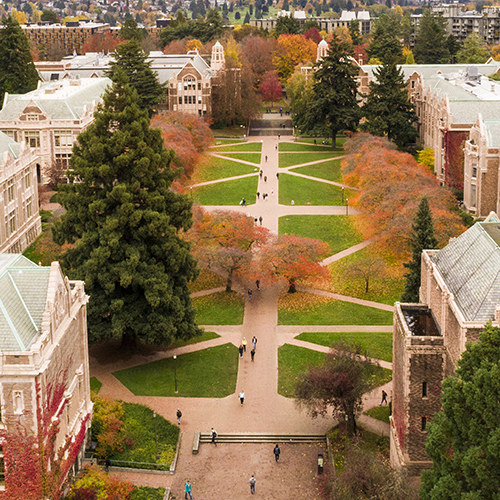
A Nobel, an Inventor, a Polymath & More
Recent awards and appointments celebrate Arts & Sciences faculty and staff for their research, leadership, and more.
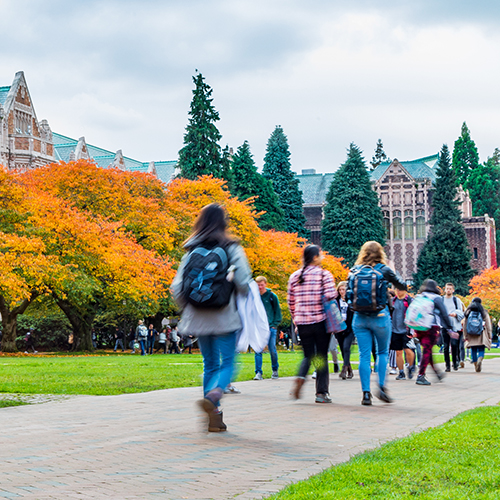
Meet Our 2024 Graduate Medalists
Meet the three students selected by the College of Arts & Sciences as 2024 Graduate Medalists for their accomplishments.
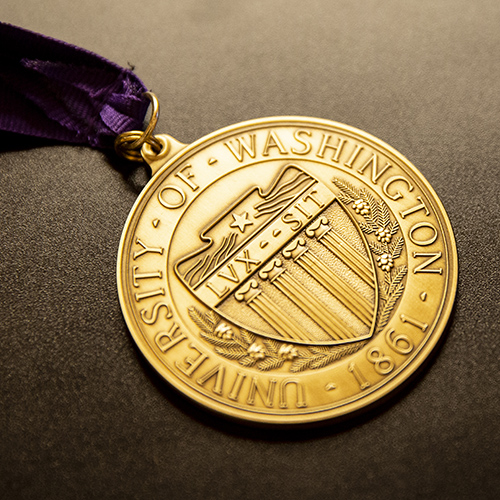
Celebrating Excellence in Arts & Sciences in 2024
This spring, the UW and the College of Arts & Sciences celebrated faculty, staff, and students for their many accomplishments.